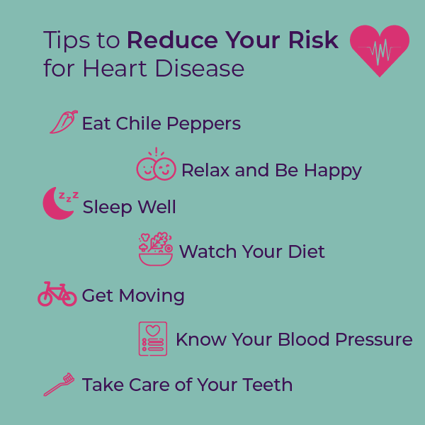 February is American Heart Month.
February is American Heart Month.
Given the stats behind heart disease, it’s important for employers to participate in education this month. Heart disease claims more American lives than any other health condition.
In fact, every 37 seconds, someone in the U.S. dies from cardiovascular disease.
Since matters of the heart are important, now is the time to discuss risk factors for heart disease with your employees. Cardiovascular disease is ranked as one of the most expensive medical conditions for employers thanks to the costs of medicine, health care services, and lost productivity. This post will cover risk factors for heart disease and foods to eat to lower heart disease risk.
Want to share with your employees how to improve heart health?
Here’s how to reduce risk factors for heart disease:
1. Eat Chile Peppers
One way to improve heart health is by downing chile peppers. Yes, those fire-red peppers are good for your cardiovascular system.
A study published in the Journal of the American College of Cardiology analyzed the diets of 20,000+ Italian adults. Research uncovered that eating chili peppers regularly is linked to a lower risk of death by heart disease.
A 2017 University of Vermont research report determined that hot red chile pepper consumption was linked to a 13% reduced risk of death. While some dispute the findings by noting that people who regularly eat chili peppers probably eat a diet that is healthier overall, it’s still not a bad idea to add this red-hot pepper to your diet.
2. Relax and Be Happy
Don’t worry; be happy. Easier said than done, right? Unfortunately, though, long-term exposure to stress hormones, like cortisol, can cause serious medical problems. High levels of stress over time can lead to high blood pressure, heart disease, and can affect the way blood clots.
Stress can also lead to other unhealthy habits, like smoking, overeating, drinking too much, or not getting enough exercise. Certain conditions — like depression — can make it more difficult to manage stress as well. Heart disease and depression are linked, so talk to your doc if you’re feeling challenged by depression.
Ultimately, learning how to manage stress and making it a point to spend time relaxing can be good for your health. Some ideas: meditating, journaling, spending time with friends and family, exercising, etc. are enjoyable ways to bring cortisol levels down.
3. Sleep Well
Regardless of other healthy habits you may have, not getting enough sleep puts you at a higher risk of heart disease. Researchers aren’t sure exactly what’s behind this connection, but not enough sleep disrupts biological processes like blood pressure and glucose metabolism.
On the other hand, sleeping too much is also unhealthy. Ideally, adults should aim for 7-9 hours of uninterrupted sleep a night. In most cases, more than nine hours is too much.
4. Watch Your Diet
A more natural, less processed diet is an easy way to eat for heart health. Staying away from processed foods and upping your intake of fruit, vegetables, and whole grains is best. Skip consuming vegetables with creamy sauces (like the frozen varieties) and fried or breaded vegetables.
A few tips for a heart-healthy diet:
- Avoid all trans fats
- Limit portion sizes
- Choose lean proteins like lean meats, legumes, eggs, and soy
- Limit saturated fats (no more than 5-6% of your daily calories)
- Watch calories to maintain a healthy weight
One of the smartest ways to immediately improve heart health is to reduce your sodium intake. The American Heart Association (AHA) recommends no more than 2,500mg/day with 1,500mg/day being optimal. Skip adding salt to your food, and opt for fresh produce and minimally processed foods.
5. Get Moving
One of the highest risks of heart disease is living a sedentary lifestyle. Any exercise is better than none. Even if you're not an active person, you can slowly ease into a workout routine.
Aim for at least 30 minutes of activity five times a week. Or, shoot for 150 minutes per week of moderate-intensity physical activity, according to the AHA standards.
Don’t have much time? Exercise for less time by working out harder. At least 75 minutes of vigorous exercise per week is the AHA’s alternate recommendation.
6. Know Your Blood Pressure
High blood pressure can lead to heart disease and heart failure as well as other serious conditions like strokes and kidney damage. It’s important to get your blood pressure checked regularly because high blood pressure typically has no symptoms. That’s why it’s known as the “silent killer.”
The time frames recommended for checks vary with health and age. You’ll want to get checked at least every five years if you have normal blood pressure and once per year if it’s usually on the high side. More importantly, follow your doctor's recommendations based on your specific health conditions.
7. Take Care of Your Teeth
Oral health and heart health have been linked together often over the last several years. More research is needed, but studies have shown that:
- Gum disease is linked to an increased risk of developing heart disease
- Poor oral health increases bacterial infection risk and may impact heart valves
- Oral health may be particularly important if you have artificial heart valves
Diabetes and cardiovascular disease are strongly connected. Additionally, there’s evidence that diabetics in particular benefit from periodontal treatment. According to the National Institute of Diabetes and Digestive and Kidney Diseases, “Adults with diabetes are nearly twice as likely to die from heart disease or stroke as people without diabetes.”
Spread the Word on How to Improve Heart Health
Heart disease impacts thousands of people each year. More than likely, it’s impacting workers in your office, too.
By spreading knowledge of risk factors for heart disease — and its complications — it’s possible to save a life. Knowledge is power, and by sharing these simple insights you could encourage someone to get to a doctor or focus on their heart health.
Want more articles to share on how to improve heart health? Check these out:
- 12 Facts You Probably Didn’t Know About Your Heart
- Want a Healthier Heart? Eat These Heart-Healthy Foods!
- 7 Heart Health Facts to Share During American Heart Month
As an employer, ask employees how you can help them better manage stress, eat healthier, and find a work-life balance that allows them to tend to their health. Work with your wellness committee this month to bring employees the resources they need to focus on their heart health.
How do you plan to lower your risk of heart disease? Let us know in the comments below!
Healthy employees are the best employees. Check out our free guide The Employee Wellness Project for tips and tricks from top health experts on improving overall health.



